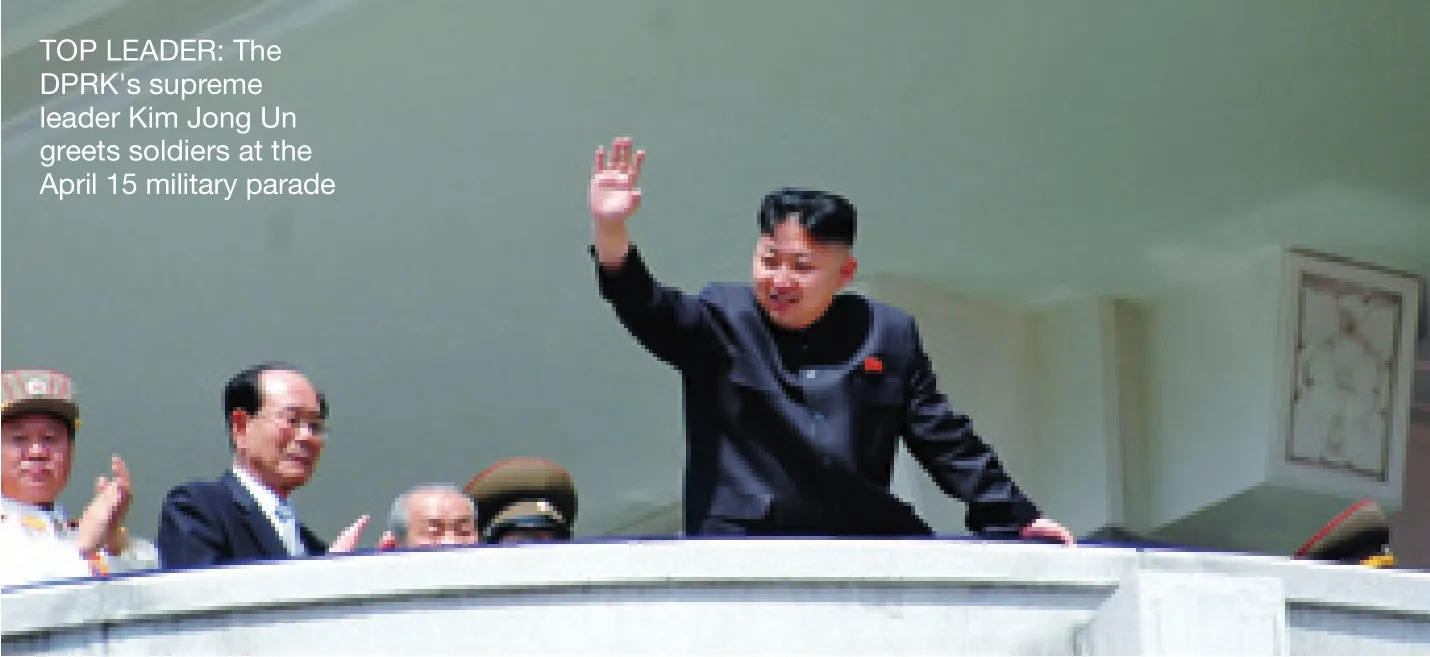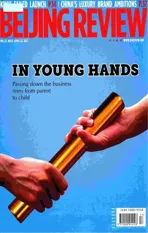Kim Jong Un’s First Shot
2012-10-14TalksremainessentialafterNorthKoreafailedsatellitelaunchByDingYing
Talks remain essential after North Korea’s failed satellite launch By Ding Ying
Kim Jong Un’s First Shot
Talks remain essential after North Korea’s failed satellite launch By Ding Ying

ZHANG LI
The Democratic People’s Republic of Korea (DPRK) failed to launch its Earth observation satellite on April 13,which gave the rest of the world some relief.The world had been focusing for a month on the scheduled satellite launch. If the satellite launch had succeeded, the situation on the Korean Peninsula would be even more tense.
But observers pointed out that even if the situation temporarily eases up, the DPRK will not give up its effort on its national defense development. Peaceful talks are still the fi nal solution on the peninsula, especially after the DPRK’s young new leader Kim Jong Un was of fi cially elected to top posts.
An open show
Although the satellite launch failed, it re fl ected the DPRK’s open and confident attitude.The technological show failed, but the political show succeeded.
Yang Xiyu, a research fellow with China Institute of International Studies (CIIS), pointed out that the whole satellite launch process showed a major change in the DPRK’s attitude, which is more open and con fi dent. The DPRK declared the launch schedule weeks before, invited international media to watch and fi lm the launch, and admitted the failure.
“The DPRK showed the biggest transparency it could,” said Yang. He recalled that the DPRK made two previous satellite launches in 1998 and 2009 respectively, which were both secretly carried out. The obvious change reflected the different thinking of the country’s new leadership on politics, as well as on science and diplomacy, Yang said. Shortly after the launch this year, the DPRK announced the satellite failed to enter its orbit and scientists and technicians were trying to find the cause of the failure.
The DPRK held a military parade on April 15 to celebrate the 100th anniversary of the birth of founding leader Kim Il Sung.DPRK leader Kim Jong Un, who became fi rst secretary of the Workers’ Party of Korea, the DPRK’s ruling party, first chairman of the DPRK National Defense Commission and the country’s supreme leader several days before,was present at the event and made a public speech. This was very different from his father, Kim Jong Il, who rarely spoke in public.
Shen Dingli, a professor with Fudan University in Shanghai, said the failed satellite launch had achieved the DPRK’s political goal. He speci fi ed that there were three main goals for the DPRK. The first was to break international restrictions. The second was to make its technology more advanced. The third was to show off the country’s technology and capabilities before the whole world.The DPRK achieved the fi rst two of the three goals, Shen said. Even though the launch failed, the DPRK accumulated experience for future success, he added.
Experts believe this was not the DPRK’s last hi-tech show. Shen said the DPRK, unwilling to stand outside the aerospace club, must conduct more tests to realize its technological progress.He believed the next test will be carried out at a good political and diplomatic time after the country’s technology is perfected.
Zhang Liangui, an expert on Korean Peninsula issues at the Party School of the Central Committee of the Communist Party of China, pointed out that the failed satellite launch delayed the showdown between Washington and Pyongyang. He said the U.S.Strategic Command issued a military plan for the DPRK in mid-February 2011. According to the plan, the United States would carry out a destructive attack with nuclear and conventional weapons against the DPRK’s weapons of mass destruction once the DPRK obtained the ability to threaten the United States. If the recent satellite launch had succeeded, the United States might implement this military plan in advance, Zhang said, adding now the situation will stabilize for several years.
Zhang also believed the DPRK will not change the goal of strengthening its national defense, nor will it give up developing nuclear ability. The recent failure will only remind the DPRK to make more adequate preparations before taking such actions, he said. According to the DPRK’s recent state budget, the country’s defense budget in 2012 will account for 15.8 percent of its total fi scal expenditure.
The DPRK’s satellite launch triggered strong reactions from around the world.Experts pointed out although the launch caused dif fi culties for peaceful talks for some time, economic sanctions cannot replace peaceful talks as the final solution to the Korean Peninsula nuclear issue.
In February, Washington signed an agreement with Pyongyang, promising to provide food assistance. In return, the DPRK agreed to impose a moratorium on nuclear tests and long-range missile launches. The United State suspended the agreement after the DPRK announced its satellite launch plan.
Talks, not sanctions
The UN Security Council strongly condemned the satellite launch on April 16,saying the move raised “grave security concerns” and demanding Pyongyang’s full compliance with relevant Security Council resolutions. This statement was made by the 15-nation UN body after days of closed-door consultations.
According to the statement, since the satellite launch used ballistic missile technology, it was a serious violation of Security Council resolutions 1718 (2006) and 1874(2009). Under these resolutions, the DPRK is prohibited from conducting launches that use ballistic missile technology.
The DPRK declared on April 17 that it now wasn’t obliged to the February agreement with the United States and would continue to launch satellites, and it also rejected the UN Security Council statement condemning its satellite launch. The country stressed that it would continue to explore space for peace purposes, and develop satellite launching skills necessary for the country’s economic development.
Shen said it is hard to predict the future relationship between Washington and Pyongyang. But now the chance of resuming direct dialogue between the two sides is very slim.

MILITARY DISPLAY: A wide array of military equipment, including tanks and missiles, rumble past the podium during a military parade marking the centennial of the birth of former DPRK leader Kim Il Sung in Pyongyang on April 15
He suggested restarting U.S.-DPRK dialogue under a multilateral framework,and the six-party talks provide a ready-made platform. He also said the DPRK might hope to win Washington’s respect with technology and change their relationship, but this is not a right way to move forward. Reform and development are more important for the DPRK to gain a sense of security, said Shen.
He pointed out hostilities between Washington and Pyongyang result from the clash of their values. If the DPRK changes its values after decades of development, then it will be a good time for the two countries to reach a fi nal consensus, and the crisis on the Korean Peninsula will be solved. But before that day comes, confrontation between the two sides will continue, and may even worsen, Shen said.
China called for more talks after the launch, stressing that dialogue and consultations are the only right way to solve problems.“China participated in the Security Council consultations in a responsible and constructive way,” said Liu Weimin, spokesman of the Chinese Ministry of Foreign Affairs, adding that China believes the Security Council should make more efforts to promote dialogue and maintain peace and stability on the Korean Peninsula. China also promised to stay in close touch with all the other parties concerned.
Zhang Xiao’an, Vice President of the United Nations Association of China, said the DPRK should understand that the UN Security Council’s official statement is moderate. She explained that the statement reflected a balanced common understanding of the 15 nations, and it didn’t authorize any new sanctions against the DPRK.
Qu Xing, President of the CIIS, said historical experience proves that sanctions have never played an active role in settling problems. “Sanctions and embargoes cannot resolve the root of this problem. The United States has been carrying out sanctions against the DPRK, but the sanctions haven’t worked out as Washington had planned,” Qu said.
If the related parties adopt an attitude of remaining in close touch, it will help to solve the con fl ict in a peaceful way, he added.
